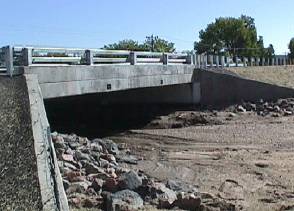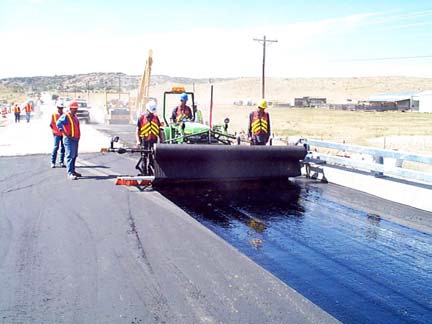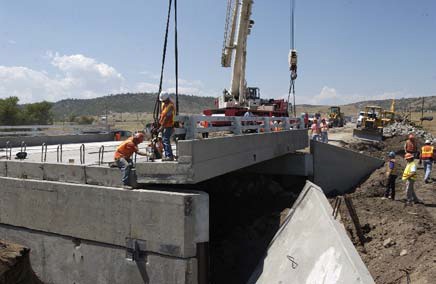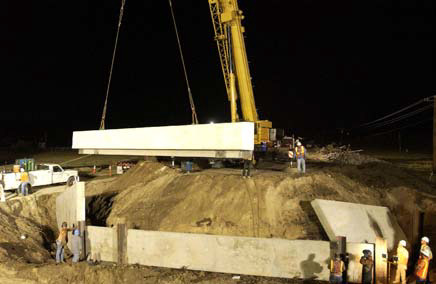State: CO
County: Douglas
Owner: State
Location: Rural
Spans: One-span
Beam material: Concrete
Max Span Length (ft.): 40
Total Bridge Length (ft.): 40
Construction Equipment Category: Conventional
ABC Construction Equipment: Conventional
State ID Number: G-17-CE
NBI Number:
Coordinates
Latitude: 39.393389 | Longitude: -104.773139
Bridge Description
Project Summary:46-hour weekend closure to replace deteriorated bridge with totally precast bridge
Project Location:
State Highway 86 over Mitchell Gulch between the towns of Franktown and Castle Rock, southeast of Denver
Impact Category:
Tier 2 (within 3 days)
Mobility Impact Time:
ABC: Weekend closure (46 hours)
Conventional: Two to three months
Primary Drivers:
reduced traffic impacts; improved work-zone safety due to reduced work-zone time
Dimensions:
40-ft-long and 43-ft-wide single-span prestressed concrete slab bridge
Average Daily Traffic (at time of construction):
12000
Traffic Management (if constructed conventionally):
Traffic management alternative, if constructed conventionally: extended use of detour
Existing Bridge Description:
The existing two-span timber bridge was 40 ft long and 26 ft wide with two 11-ft-wide traffic lanes and two 1.5-ft-wide shoulders. Built in 1953, it was deteriorated and required replacement.
Replacement or New Bridge:
The cross-section of the replacement bridge consists of two 12-ft-wide traffic lanes and two 8-ft-wide shoulders. It has a single span with side-by-side precast slab beams welded onto 44-ft-wide precast abutments and 23-ft-long precast wingwalls welded to driven steel H piles. Each abutment consists of lower and upper units. The precast abutment units have embedded plates precast into them for welding the units together in the field. Each of the four wingwalls is a separate precast piece. The bridge superstructure consists of eight precast slab beams each 5.33 ft wide, 1.5 ft deep, and 38.33 ft long.
Construction Method:
Prior to the bridge closure, the contractor constructed a short detour to divert traffic for the weekend, and also drove 40-ft-deep steel H piles at the abutments in the stream banks just outside the existing roadway width. The precast concrete abutments, wingwalls, and slab beams were fabricated at an offsite plant and shipped to the site just before being installed. The outside slab beams were constructed with integrated bridge railing to avoid the need for a separate railing installation operation in the field.
Friday evening:
At 7 pm on Friday the bridge was closed and traffic diverted to the detour. The existing timber bridge was demolished.
Saturday:
Early Saturday morning, the abutment units and wingwalls were erected with a crane and welded to the steel H piles and to each other prior to placing flowable fill behind the abutments. On Saturday afternoon, the eight slab beams were erected, including the edge beams complete with precast railing. The units were then transversely post-tensioned and grouted. Work stopped at 11 pm.
Sunday:
At 7 am Sunday, work resumed. The earthwork was completed and the asphalt overlay was placed, with membrane applied between the first two exterior precast slabs. The bridge was reopened to traffic at 5 pm on Sunday, 13 hours earlier than the required 6 am Monday opening. The bridge was closed for 46 hours, but only 38 hours of actual construction work was needed.The Colorado DOT had awarded the construction contract to replace the deteriorated bridge with a conventional 3-cell cast-in-place concrete box culvert. However, the contractor was concerned about the safety of his construction crews on this project because of the steep downward grade of the highway approach from the west in combination with the nearby curve of the detour around the bridge site. The contractor teamed with a local design firm to submit a value engineering change proposal to build the single-span totally prefabricated bridge over a weekend to limit the onsite exposure time of his crew. The Colorado DOT accepted the value engineering change proposal, with no change to the project funding. However, as part of the acceptance of the proposal, CDOT implemented a lane rental specification that imposed costs should the contractor exceed the allowed weekend closure. If the bridge was not opened by 6 am on Monday, the contractor was required to pay a lane rental fee of $500 per hour or portion of an hour of lane closures on SH 86. The lane rental was based on road user costs to occupy SH 86. No incentives were included in the contract.
Stakeholder Feedback:
The bridge is expected to see a 75-year service life due to the quality of its prefabricated components and the attention given to connection details. The bridge continues to perform well.
Lessons Learned:
The proposed bridge span should be longer than the existing bridge to avoid interference between new and existing piles, and the deep foundation construction could be prior to precast component installations. This will reduce the construction time.
High Performance Material:
Project Planning
Decision Making Tools:Site Procurement:
Project Delivery: Design-bid-build
Contracting: Full lane closure, Lane rental, Value Engineering
Geotechnical Solutions
Foundations & Walls:Rapid Embankment:
Structural Solutions
Prefabricated Bridge Elements: Adjacent slab beams, Precast abutment caps, Precast abutment stems, Precast wingwallsPrefabricated Bridge Systems:
Miscellaneous Prefabricated: PT ducts/bonded, Asphalt overlay w/membrane, Prefabricated railing
Costs & Funding
Costs:The engineer’s estimate for this project was $ 394.2K. The low bid was $365.2K ($29,000 = 7% lower than engineer’s estimate). There were 12 bidders.
Funding Source:
State Only
Incentive Program:
Additional Information
Downloadable Resources
Contract Plans: View SH86-Mitchell-Gulch-VE-Plans.pdf
View SH86-Mitchell-Gulch-VE-Change-Proposal.pdf
View SH86-Mitchell-Gulch-Specifications.pdf
View SH86-Mitchell-Gulch-Bid-Cost.pdf
View SH86-Mitchell-Gulch-VE-Construction-Schedule.pdf
Other Related Information:
AASHTO TIG/FHWA Prefabricated Bridges 2004, Good Business – Best Practice
Other Related URLs:
Colorado Department of Transportation
Contacts
Owner:
Michael Collins, P.E.
State Bridge Engineer
Colorado Department of Transportation
Michael.Collins@state.co.us
303-757-9190

